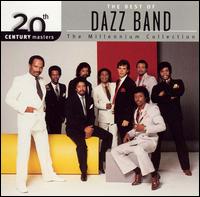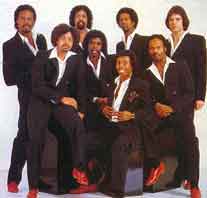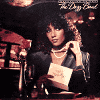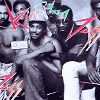
• Dozier & Yamamoto clans
• Oklahoma
• Oklahoma's History
• Tulsa
• Booker T.
• Oklahoma State
• Turley Jets
• Japan
• Tokyo
• Tokyo Eagles Baseball
• Hapa Club
• Burnt Toast Club
 The Dazz Band came about when founder Bobby Harris (sax, clarinet, background vocals) formed a fusion group entitled Telefunk, which featured Isaac "Ike" Wiley, Jr. (drums), his brother Michael Wiley (bass), Michael Calhoun (guitar) and Kenny Pettus (percussionist/vocalist). Telefunk eventually became Kinsman Dazz, Kinsman being the name of the street Harris grew up on in Cleveland. Dazz stood for danceable jazz, and had no connection whatsoever to the incredible song by Brick as DB hadn't changed its name before the No. 1 hit came out in '76. Still a lot of people missed out on the talented Atlanta group (Brick) thinking the Dazz Band had come out with that tune. Brick's music is very positive and what I like to call "happy."
The Dazz Band came about when founder Bobby Harris (sax, clarinet, background vocals) formed a fusion group entitled Telefunk, which featured Isaac "Ike" Wiley, Jr. (drums), his brother Michael Wiley (bass), Michael Calhoun (guitar) and Kenny Pettus (percussionist/vocalist). Telefunk eventually became Kinsman Dazz, Kinsman being the name of the street Harris grew up on in Cleveland. Dazz stood for danceable jazz, and had no connection whatsoever to the incredible song by Brick as DB hadn't changed its name before the No. 1 hit came out in '76. Still a lot of people missed out on the talented Atlanta group (Brick) thinking the Dazz Band had come out with that tune. Brick's music is very positive and what I like to call "happy." Kinsman Dazz went to L.A. to record for producer Marvin Gaye after landing a deal with 20th Century Records exec Joe Lewis. Gaye, however, got sick during the recording sessions and had to back out of the duties and Harris requested and got Philip Bailey (great vocalist of Earth, Wind & Fire and Christian solo artist), who was the first producer for the first album, Kinsman Dazz and co-produced the second one, Dazz. Bailey helped the group tremendously with vocal arrangements, which is probably why the group were noted in this area. Bailey's expertise led DB to getting a good feel with regards to their vocals and the experience was something the band might have taken years to improve. The downside was that the first album sounded a lot like EW&F material.
The Kinsman Dazz became the Dazz Band after 20th Century (of course best known as the movie company, 20th Century Fox) dissolved their record division and subsequently got signed to a deal with Motown. The group changed personnel and included the originals, Harris, Wiley brothers and Pettus, and brought on newcombers, Keith Harrison (keyboards/vocals),  Steve Cox (keyboards), Eric Fearman (guitar), Pierre DeMudd (trumpet/vocals [falsetto], and Sennie "Skip" Martin (lead vocals/trumpet), who is on my Top 10 all-time R&B vocalists - list to come one day. Martin would eventually join Kool & The Gang after original "Kool" lead man James Taylor tried to go it, unsuccessfully, alone. Martin was vocalist for almost all the Dazz Band hits including Grammy winner 'Let It Whip'.
Steve Cox (keyboards), Eric Fearman (guitar), Pierre DeMudd (trumpet/vocals [falsetto], and Sennie "Skip" Martin (lead vocals/trumpet), who is on my Top 10 all-time R&B vocalists - list to come one day. Martin would eventually join Kool & The Gang after original "Kool" lead man James Taylor tried to go it, unsuccessfully, alone. Martin was vocalist for almost all the Dazz Band hits including Grammy winner 'Let It Whip'.
Dazz's first album for Motown, Invitation to Love, was self-produced by the group. They followed up that effort with Let The Music Play, which featured the single 'Knock! Knock!'. The group started making headway and gained notoriety with the 3rd release, Keep It Live(1982, 5 weeks at No. 1) and a Grammy for 'Let It Whip'. All the while the group was producing some fantastic ballads but felt the need to strike it big with a dance hit.
They would go on to score R&B hits with Swoop (I'm Yours), Joystick, Let It All Blow, and Party Right Here, but to this writer the ballads were the best part of the Dazz Band and includes: Now That I Have You, Stay A While With Me, Just Believe In Love, Until You, Heartbeat; and two Pierre DeMudd-led scores: Let Me Love You Until and my personal favorite, We Have More Than Love, where DeMudd shows tremendous vocal range.
After
What made Dazz Band so solid was the combination of great vocals with incredible musicans. Unfortunately I never saw the band perform live but bought almost all the vinyl and have a number of CDs and followed Martin when he went and fronted for Kool & The Gang for the album, Sweat.
Discology:
Invitation to Love (1980)
Let the Music Play (1981)
Keep It Live (1982)
On the One (1983)
Joystick (1983)
Jukebox (1984)
Hot Spot (1985)
 Wild & Free (1986)
Wild & Free (1986)
Rock the Room (1988)
Under the Streetlights (1995)
Double Exposure (1997)
Here We Go Again (1998)
Time Traveler (2001)
As Kinsman Dazz:
Kinsman Dazz (1978)
Dazz (1979)
Links
Skip Martin - Official site of the tenor originally from the San Fran Bay Area.
Soul Walking UK
Lyrics of Dazz
Diskology
